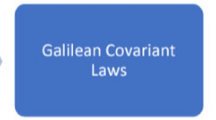Abstract
In this paper, I explore whether elementary classical mechanics adheres to the Principle of Composition of Causes as Mill claimed and as certain contemporary authors still seem to believe. Among other things, I provide a proof that if one reads Mill’s description of the principle literally (as I think many do), it does not hold in any general sense. In addition, I explore a separate notion of Composition of Causes and note that it too does not hold in elementary classical mechanics. Among the major morals is that there is no utility to describing classical mechanics in terms of Composition of Causes. This is both because the stated principles do not hold and because when one describes what actually does hold in classical mechanics in terms of the Composition of Causes, one introduces misleading associations that can generate errors just as claimed by Russell (Mysticism and logic, 1981).
Similar content being viewed by others
References
Anscombe G.E.M., Geach P.T. (1961) Three philosophers. Basil Blackwell, Oxford
Cartwright N. (1989) Nature’s capacities and their measurement. Clarendon Press, Oxford
Cartwright, N. (1992). Aristotelean natures and modern experimental method. In J. Earman (Ed.), Inference, explanation, and other frustrations: Essays in the philosophy of science (chapter 3, pp. 44–71). Berkeley: University of California Press.
Cartwright, N. (2007). What makes a capacity a disposition? In [Kistler and Gnassounou (2007)] (pp. 195–205).
Ellis B. (1999) Causal powers and laws of nature. In: Sankey J. (eds) Causation and laws of nature. Kluwer Academic Press, Dorderecht, pp 19–34
Gnassounou, B., & Kistler, M. (2007). Introduction. In [Kistler and Gnassounou (2007)] (pp. 1–40).
Goldstein H. (1980) Classical mechanics. Addision-Wesley, Reading, MA, USA
Harré R., Madden E. (eds) (1975) Causal powers: A theory of natural necessity. Basil Blackwell, Oxford
Hertz H. (1956) The principles of mechanics. Dover Publications, Inc, New York
Hume D. (1977) An enquiry concerning human understanding. Indianapolis, Hackett Publishing Company
Kant, I. (2005). Metaphysical foundations of natural science (Michael Friedman, Trans.).
Kistler, M., & Gnassounou, B. (Eds.). (2007). Dispositions and causal powers. Hampshire, England: Ashgate.
Mill, J. S. (1967a). Autobiography. In Collected works. Toronto: Toronto University Press.
Mill J.S. (1967b) A system of logic. Longmans, Green and Co, London
Norton, J. (2007). Causation as folk science. In Causation, physics, and the constitution of reality: Russell’s republic revisited (pp. 11–44). Oxford: Clarendon Press.
Pars L. (1979) A treatise on analytical dynamics. Ox Bow Press, Woodbridge, Conn
Russell B. (1903) Principles of mathematics. W.W. Norton and Company, New York
Russell, B. (1981). On the notion of cause. In Mysticism and logic (chapter 9, pp. 132–151). Totowa, New Jersey: Barnes and Noble Books.
Smith S. (2002) Violated laws, Ceteris Paribus clauses, and capacities. Synthese 130(2): 235–264
Smith S. (2007) Special cases, of causes, and the complexity of nature: The derivation of constitutive equations with cross-effects in non-equilibrium thermodynamics. Studies in the History and Philosophy of Modern Physics 38(1): 80–96
Wilson M. (1998) Mechanics, classical. In Routledge encyclopedia of philosophy. London: Routledge.
Author information
Authors and Affiliations
Corresponding author
Additional information
I would like to thank Tony Martin and audiences at the Pacific APA and the University of Pittsburgh for helpful comments on a previous draft. All remaining errors belong to me alone.
Rights and permissions
About this article
Cite this article
Smith, S.R. Elementary classical mechanics and the principle of the Composition of Causes. Synthese 173, 353–373 (2010). https://doi.org/10.1007/s11229-008-9442-3
Received:
Accepted:
Published:
Issue Date:
DOI: https://doi.org/10.1007/s11229-008-9442-3




